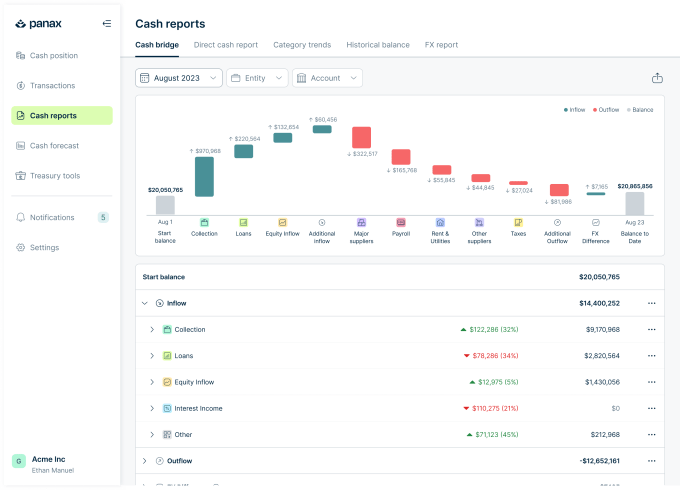Israeli startup Panax raises a $10M Series A for its AI-driven cash flow management platform
High interest rates and financial pressures make it more important than ever for finance teams to have a better handle on their cash flow, and several startups are hoping to help.
Two-year-old Israeli startup Panax is one, and it just raised a $10 million Series A round of funding led by Team8, with participation from TLV Partners.
Startups have had some luck going after the CFO stack by streamlining processes and freeing up time to work on strategic tasks. SVB's collapse created tailwinds for the cash management category, which includes players such as Embat, Kyriba, Statement and Vesto.
Unlike some of these, Panax is focused on midsize and large companies in traditional industries such as manufacturing, logistics and real estate. While they need more than startups do, they don't always have the type of large treasury departments that legacy solutions cater to.
Target aside, Panax also hopes to differentiate itself in its offering, and not just by including investment accounts and credit lines in its purview.
While visualizing cash flow is helpful, Panax wants to go further than providing a dashboard, Panax CEO Noam Mills told TechCrunch. She thinks helping their clients requires "using data to understand what's really important, influencing those decisions and helping them manage [their treasury]."
This value proposition seems to resonate with Panax's early adopters, which include companies such as public beauty-focused company Oddity, and for which cash management automation is a time and money saver.
Bringing its total funding to $15.5 million following a $5.5 million seed round led by TLV Partners, this new round will help Panax scale its go-to-market approach and build a more robust AI and data team now that it has enough data for this, Mills said.
AI already plays an important role at Panax: It helps the startup make sense of all the financial data it puts together, but also identify insights and forecast cash flow. For Mills, surfacing action items is where AI can really help. "Oftentimes there's no formal treasury department […] so we see AI as a great enabler to be proactive and raise the right flags for the client."

Image Credits: Panax
The clients Panax is going after are companies with complex treasury management needs; typically, they operate in several locations in currencies. Foreign exchange is one aspect Panax can help optimize, and this could drive additional for the company besides its SaaS model, which is priced based on the complexity of each client's operations.
There are many stakeholders hoping to get a share from helping companies optimize their cash flow. For instance, they could apply for loans and request working capital or credit lines from their banking app or from their accounting software interface. But Panax has a card to play as a one-stop treasury management dashboard that integrates recommendations and projections.
Panax's goal, Mills said, is that finance teams won't have to go anywhere else to execute decisions they should make. "[That] if we bring them the insights, they can move more cash into interest bearing accounts. Embedding that functionality within our platform is something that we see as really tightly connected to our value proposition, and those are also things that we're developing across many different use cases with money movements."
Mills' understanding of these needs comes from her experience in private equity, which she shares with chief business officer and co-founder Niv Yaar. But her personal background is quite unique: Before her roles in PE and corporate finance, she was an Olympic fencer for Israel, and won several titles in her home country.
Asked what her athlete past and CEO role have in common, she highlighted similar psychological requirements, such as persistence and the ability to deal with uncertainty. But fencing is an individual sport, when running a company "is more like a team sport."
Following its Series A round, Panax will expand its NYC office and Yaar will move there, but its R&D will remain in Israel. So will Panax CTO and third co-founder, Sefi Itzkovich, who worked on machine learning at Facebook after the company where he previously rose up to CTO, Otonomo, went public via a SPAC.
"There is competition for talent everywhere [but] the deep roots we have in the R&D community in Israel through our CTO and the founding team gives us somewhat of an advantage competing for talent," Mills said.
Mills expects that network effects will also play a role in New York City, where Team8 has an office. But she and her co-founders also picked the city because of the additional overlap with Israel's time zone compared to the Bay Area, and because of its relevance for fintech. "The center for that is more in New York and the East Coast," Mills said.


